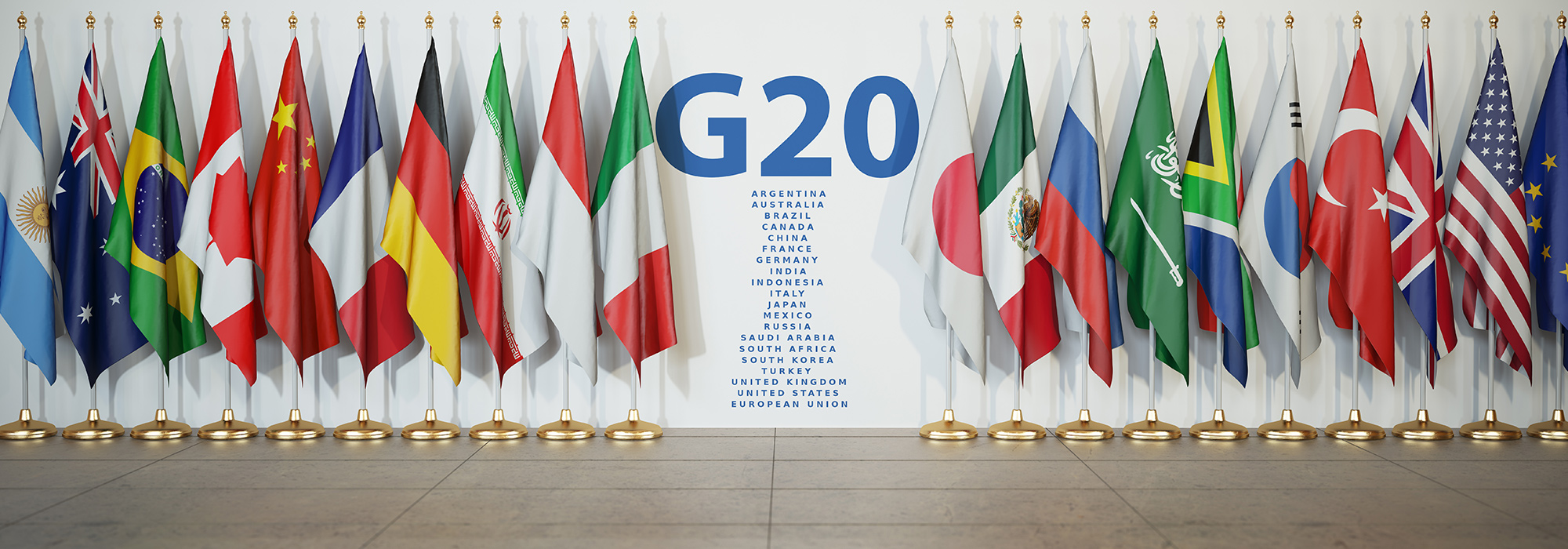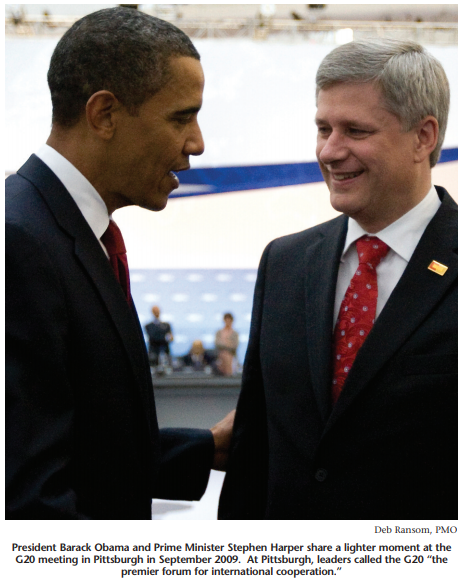
Canada is preparing to co-host, with Korea, the G20 meeting of world leaders in Toronto at the end of June. Every year brings challenges, some old, some new, for summits to tackle; rarely have the issues been of the import and complexity of this year’s.
The G20 leaders’ process, launched in Washington in the midst of a global crisis, proved very effective in establishing a common understanding of the scale and scope of the financial crisis, and in marshalling support for a coordinated international fiscal and monetary stimulus.
Subsequent G20 summits, in London and Pittsburgh, laid out a work plan to repair the international financial system and a macroeconomic plan to jump start recovery. With recovery now under way — although many countries are still reliant on fiscal stimulus — and financial systems stabilized but still traumatized, G20 leaders will need to begin dealing with coordinated “macroeconomic exit strategies,” and turn the blueprint for needed financial system reforms into early and comprehensive actions.
As complex as these problems are, the September 2009 Pittsburgh G20 Leaders’ Statement set out an ambitious, multiyear, six-part agenda and broadened the role of the G20 to be “the premier forum for our international economic cooperation.” Thus, there will be pressure for the G20 to tackle other pivotal global economic challenges, including climate change and multilateral trade. In short, the summit will have to deal with tough issues and big expectations.
At their Pittsburgh summit in 2009, the G20 leaders made three decisions with far-reaching consequences. First, they designated the G20 as the key forum for international economic cooperation, with all the responsibilities, expectations and challenges that entails. Second, they set out an ambitious and far-ranging agenda, one that appeared more detailed and more interventionist than pre-crisis pronouncements by the G8. This cooperative policy agenda contained six elements: creating the conditions for strong and sustainable growth; strengthening the international financial regulatory system; modernizing the global institutions, notably the International Monetary Fund and the World Bank; dealing with energy security and climate change (including an interesting pledge to intensify efforts to reach agreement in Copenhagen through the United Nations Framework Convention on Climate Change (UNFCCC) negotiations); strengthening support for the most vulnerable; and committing to an open global economy, including a “determination” to seek an ambitious and balanced conclusion to the Doha Development Round in 2010. The third decision involved instilling the process with a greater managerialism by setting out objectives, determining whether the sum of the national policies is mutually consistent with these global objectives, tracking progress in a rigorous and hopefully transparent manner and being accountable for the results.
The best insight into how G20 leaders see this new process working is contained in their Framework for Strong, Sustainable, and Balanced Growth. In this, they speak of a new “compact,” where the G20 will agree on shared policy objectives and individually set out medium-term policy frameworks consistent with these shared objectives. Then there will be a cooperative process of mutual assessment of these policy frameworks, to determine whether they add up to a balanced macroeconomic environment or pose global stability risks. G20 leaders also set the clock running on this new approach, instructing their finance ministers and central bank governors to have it launched by November 2010, with a report to the November G20 Summit in Korea.
Recovery from the shock of the worst global financial crisis since the 1930s and the awe of the first synchronized global recession in postwar memory is under way. It will not be a harmonious or rapid cyclical recovery.
What precipitated the recession was a financial crisis, for the first time in a long time. Therefore, the recovery will be a complex interaction of a more traditional cyclical recovery of inventory, income and spending adjustments, with a less traditional balance sheet recovery involving deleveraging, asset write-downs and capital accumulation, which will have an impact on financial firms, households and businesses. One implication of the current financial crisis is the destruction of wealth of an exceptional magnitude; another is higher fiscal deficits everywhere and extraordinary fiscal situations in a number of industrial countries. And looming on the horizon are powerful forces of demographic change, the uncertainty of how and when the world will address climate change, and stalled multilateral trade talks.
At their Pittsburgh summit in 2009, the G20 leaders made three decisions with far-reaching consequences. First, they designated the G20 as the key forum for international economic cooperation, with all the responsibilities, expectations and challenges that entails. Second, they set out an ambitious and far-ranging agenda, one that appeared more detailed and more interventionist than pre-crisis pronouncements by the G8.
The April 2010 International Monetary Fund forecast provides as good a baseline outlook as any for the global economy over the next two years, and it is a reasonable starting point for a discussion of the risks and uncertainties facing policy-makers and markets. The good news is that the IMF believes that the global economy is recovering faster than most could even imagine last year. It expects world real GDP growth to be over 4 percent for 2010, after one of the weakest years on record, and slightly stronger, 4.3 percent, in 2011.
For the industrial countries, led by the US, growth in 2010 is expected to be over 2 percent. Driving this rebound was the extraordinary amount of fiscal and monetary stimulus, which steadied markets, stabilized confidence and created demand. Private sector demand has not yet kicked in sufficiently in a number of industrial economies. This pace of growth will do little to bring down unemployment rates in the near term. Growth in emerging and developing economies is forecast to be over 6 percent this year and next, paced by Chinese growth around 10 percent and Indian expansion near 9 percent. Africa, which avoided the worst of the crisis, is reasonably well positioned for the recovery. There is considerable variation in growth prospects across countries, and in European countries the recovery is anticipated to be sluggish, by historical standards.
Hanging over this reasonably favourable forecast is a high level of risk. The policy risks include the very large fiscal deficit situations in the US and a number of European Union countries; the still unfinished business of repairing the integrated global financial system; and the necessary rebalancing of saving versus consumption in the US and domestic demand versus externally led growth in China, which have contributed to the unsustainable macroeconomic imbalances of recent years. The uncertainty relates to confidence: Will trust be firmly reestablished in financial markets? Will policy-makers be willing and able to make the needed policy changes? Will individuals feel better about their economic prospects?
While fiscal circumstances differ across countries, there are many similarities: large fiscal deficits, reflecting stimulus measures and automatic stabilizers; massive injections of liquidity by central banks; and in some countries, government ownership stakes in what were judged to be systemically important and troubled firms.
As the recovery solidifies, governments need to develop and set out credible, multiyear fiscal consolidation strategies. Central banks need to withdraw extraordinary liquidity support and monetary stimulus in an orderly manner that is consistent with inflation pressures and financial market rebalancing. Too slow an exit strategy will risk inflation, entrenched structural deficits and rising debt; too rapid an exit strategy will risk taking the wind out of the sails of the recovery; and exit strategies that are too uneven across countries risk causing large currency swings.
The global fiscal situation has worsened markedly, but unevenly across countries, reflecting the differential impacts of the financial crisis and recession and the varying size and nature of the stimulus packages. The United States, the world’s largest economy, is confronted with its largest fiscal deficit in the postwar period, over 11 percent of GDP, and this is combined with a rapidly rising debt-to-GDP ratio. And the prospects for a substantial reduction over the next five years are fraught with much political and policy uncertainty. The fiscal situation in a number of major European countries may be even worse, with the United Kingdom’s deficit at over 12 percent of GDP, and Italy in a deficit and debt mess. The bigger European worry may be smaller countries such as Portugal, Ireland and particularly Greece, and the moral hazard risk posed by eurozone countries that are unable to deal with escalating deficit and debt dynamics. The situation in Asia is a more heterogeneous picture: while there are large entrenched deficits in Japan, and too high deficits and debt in India, the more worrying imbalances are macroeconomic.
In looking at the G20 Pittsburgh commitment to fiscal consolidation, it is useful to take Canada as a practical example. After 10 years of surpluses, Canada has a deficit this fiscal year of roughly $55 billion, or 3.75 percent of GDP. Canada has a much better budgetary situation than do many of the G20 countries. However, as we painfully learned from our long journey with deficits, it is too easy to put off for another day the difficult decisions required to balance the books, unless there is a transparent and credible five-year fiscal plan to return to fiscal balance. Our experience in balancing the books points to the importance of realistic forecasts and building prudence into the fiscal framework to protect against the inevitability of the unexpected. Canadians make excellent witnesses to the pivotal role a strong fiscal balance sheet can play in helping to insulate an economy from the ravages of external shocks. And, from past experience, Canadians can also bear witness to the fact that deficits, unlike wine, do not get better with age.
Public opinions of governments are changing, reflecting citizens’ angst at the financial crisis and recession, but also their surprise at other shocks to their prevailing view of the world. Opinion polls point to the public’s expectation that their governments would do better in preventing and protecting them in this suddenly more uncertain world.
And governments are now debating taking more active roles, in sharp contrast to the deregulatory trend set by Ronald Reagan and Margaret Thatcher. Whether the concern is unspecified worries about pervasive globalization, worry about product safety and information protection, nervousness about security, less trust in regulatory institutions and financial markets or anxiety about demographics, the solvency of pension plans and the affordability of health care, citizens in many G20 countries are gazing at the future with less certainty and looking to their governments to reassure them. And with greater skepticism in some countries about the benefits of globalization, it will be important that international governance prove itself to be up to expectations.
How well governments manage policy risks will shape the evolution of the global recovery. Restoring fiscal balance, repairing financial market regulatory systems, strengthening international economic cooperation and renewing governance in key international institutions: these are the economic policy challenges the London and Pittsburgh meetings bequeathed to the upcoming G20 Summit. Perhaps the most important thing the meeting could achieve is to demonstrate that governments will deliver on what they committed to at the previous G20 meetings: to set out credible and concrete next steps and be accountable for meeting them, and to show that the spirit of international cooperation that was evident in the crisis will be maintained in the recovery and beyond.
Macroeconomic imbalances did not cause the financial crisis, but they certainly fuelled it. Going forward, the core of the global rebalancing challenge is that the US has to save more, in both its public and its household sectors, and China has to save less, in its public sector but particularly in its household sector. Impediments to adjustment, whether they are exchange rates, tax incentives for consumption over savings or the absence of public safety nets, need to be tackled. As difficult as these changes may be politically, there is also a scale problem for the world economy, as America’s consumption represents 17.5 percent of world demand and China’s only 2 percent. This points again to the need for credible multiyear adjustment plans and cooperation among all major economies.
The origins of the global financial crisis were both stunningly modern and as old as markets themselves. Yes, there were financial products of amazing sophistication and complexity, traded around the world 24/7 through broadband networks of unbelievable power, by highly educated and trained professionals; but there was also excess liquidity, asset bubbles, greed and a suspension of common sense, which are hardly new. Markets may be efficient, but they are not always right; more transparent information and better early warning systems are needed for policy-makers and market investors. Arbitrage opportunities across financial instruments and jurisdictions point to the need for much greater regulatory cooperation within countries and across sovereign borders. Innovation incentives around regulatory systems suggest a better balance of principle-based regulation and prescriptive rules, and simplicity over complexity.
The financial reform proposals agreed on at the London and Pittsburgh G20 summits are solid steps toward dealing with these problems: consolidated regulation; caps on leverage; more and higher quality capital; “peer review” of national systems; and reformed governance to make international cooperation more effective. It is crucial to implement well and quickly what has been agreed on and, in this reregulation process, to focus on better and not just more regulation.
As challenging as the macroeconomic rebalancing and financial reform elements of the G20 Summit agenda are, they will likely prove less divisive than will either climate change or multilateral trade. The September 2009 Pittsburgh Leaders’ Statement initiated a broad and ambitious six-part agenda, and it made the G20 the forum for international cooperation. In this new governance context, there will be expectations for the G20 to provide early leadership on climate change, particularly in response to the ineffectiveness of the UNFCCC process, which was so clearly shown in Copenhagen. As the world moves uncertainly toward COP16 in Mexico City in November/December 2010, it will be crucial for there to be a robust decision-making process, and for the G20 to decide what its own role will be. A replay of the Copenhagen process, where it was unclear whether the UNFCCC, the G27, the G5, the Major Economies Forum or the G20 was steering the climate change negotiations, will not reduce global uncertainty. There is no doubt that climate change is challenging, but the absence of clarity about the rules of the game is one of the major longer-term policy uncertainties confronting the world. And in all this, Canada cannot afford to be outside the groups negotiating the critical rules.
Where does this all take us? The upcoming G20 meeting provides a key opportunity to demonstrate that a broader-based and solution-minded international economic cooperation governance structure, born in the financial crisis, will continue to be effective in the recovery and beyond. This is necessary to deal with the integrated and common nature of the policy challenges facing most countries, and it will also bolster public and market confidence.
The G20 will have to deliver on its commitments to garner this credibility. Its broader agenda serves to enlarge the tent and increase the diversity of views and interests. But it will have to guard against too ambitious an agenda in too short a time frame, carefully manage expectations and deliver early “wins” as a result of this new international governance approach. Public engagement and dialogue on these issues is also needed, to provide the understanding of why change is necessary and why difficult decisions today will alleviate the need for very unpleasant decisions in the future.
Photo: Shutterstock









